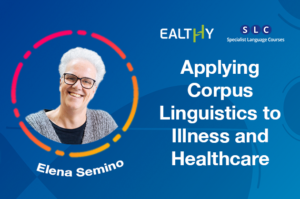
What do you get if you analyse tens of millions of words written about healthcare?
If you’re at all interested in how language works in healthcare, you’d be nuts to miss the upcoming webinar from SLC and EALTHY.

English is a global language for science, technology, business, and medicine.
Its widespread use fosters cross-cultural communication and international cooperation, facilitating the exchange of ideas, research, and medical innovations.
Being proficient in English is crucial for professionals across all disciplines, including medicine, to remain competitive and informed in a rapidly evolving global landscape.
In medicine, accurate communication is also key to patient safety and delivering quality care.
English for Medical Purposes (EMP) is a specialised branch of English language education that focuses on developing language skills specific to medical settings.
It aims to equip healthcare professionals with the ability to communicate fluently and accurately in medical situations.
A patient’s medical history, symptoms, and treatment options need to be clearly conveyed and understood. With the increasing number of international patients and medical professionals, having a common language like English lowers language barriers and helps prevent misunderstandings and mistakes. It also fosters efficient patient-doctor interactions and promotes patient-centred care.
In addition to this, healthcare professionals need to be able to read medical reports, research papers, and attend conferences. EMP courses typically include communication skills, medical terminology, and cultural awareness.
English is the lingua franca of the medical world providing common ground for international medical professionals to share knowledge, collaborate on research, and discuss best practice.
Doctors who are proficient in English can more easily communicate with their peers worldwide, gaining access to the latest medical advances and research, ultimately benefiting their patients and medical practice.
Having a high level of language proficiency is also necessary for publishing research. While this is quite a specialised area with its own specific structure and language, . a short course such as this one, where the writing and publishing process is broken down into manageable chunks. helps you understand the world of writing for publication.
Another key aspect of English in medicine is medical terminology, the specialised vocabulary used by healthcare professionals to describe medical conditions, procedures, and treatments.
Using standardised medical terminology allows healthcare providers to communicate precisely and efficiently.
It acts as a universal language for healthcare professionals when diagnosing and treating patients therefore reducing misunderstandings and potential errors.
Standardised medical terminology is used in all documentation of patient care allowing for seamless communication between medical teams promoting continuity of care and patient safety.
If you want to learn about medical terminology, this is the right course for you.
You can learn hundreds of medical terms covering body parts, symptoms, conditions, treatments and procedures.
You also learn how medical terms are formed and pronounced, and how they translate into everyday English.
For healthcare professionals seeking to improve their English language skills, SLC has courses designed to cater for different levels of language proficiency and specific medical contexts. These include:
So English for Medical Purposes plays a pivotal role in the global healthcare landscape.
It facilitates effective communication, enhances patient care, and fosters collaboration among medical professionals worldwide. With the increasing internationalisation of the medical field, doctors and healthcare providers who invest in improving their English language skills will be better equipped to succeed and make a positive impact on the healthcare community.
Enrolling in reputable courses that cater to specific medical contexts can provide the necessary language proficiency and medical terminology needed to excel in this critical area of expertise.

If you’re at all interested in how language works in healthcare, you’d be nuts to miss the upcoming webinar from SLC and EALTHY.

Back to Menu ↩ Vocational ESOL focuses on the language that migrants and refugees need when working in the UK. Different sectors require different language

At Specialist Language Courses, your progress doesn’t stop when your subscription ends. All Reach OET B Medicine, Reach OET B Nursing and all professions subscribers automatically
Get updates and get the latest materials on Medical English, OET and IELTS
